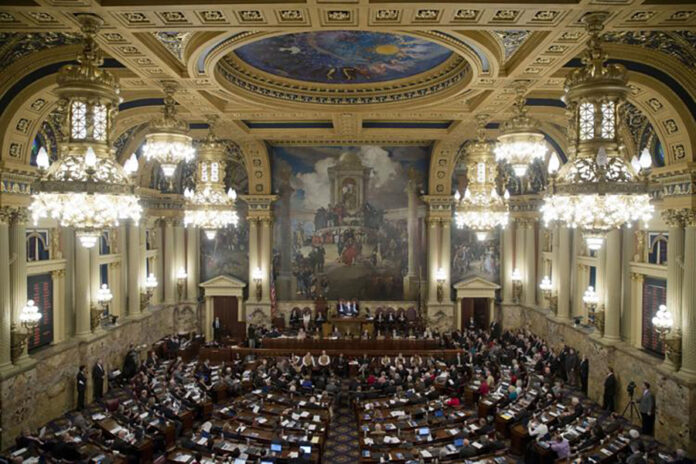
HARRISBURG, Pa.— A Democratic-sponsored proposal to boost public school funding by billions in the coming years and impose stricter rules on cyber-charter schools passed the Pennsylvania House on Monday in a test of political will as lawmakers haggle over the state budget.
The bill responds to a report issued in January that said Pennsylvania underfunds public school districts by more than $5 billion annually and recommended phasing in increases over several years. The proposed legislation would set up a new formula to distribute state education aid but does not include an appropriation of the money to fund it.
Five Republican lawmakers voted with all Democrats to approve the measure, which passed 107-94 and was sent to the state Senate.
Majority Leader Matt Bradford, D-Montgomery, said the state’s current system of doling out support has failed, calling it unconstitutional. Phased in over seven years, the measure would eventually increase state support by about $7 billion annually.
“What we’re doing is what the court has told us to do, to give every child in this commonwealth an equitable and fair public education,” Bradford said during floor debate. “This isn’t politics, this is a constitutional requirement, one that this body has failed for too long.”
The measure also would impose a range of new regulations on cyber-charter schools, including public disclosure requirements for budgets, taxes and reports to the state Education Department. Public schools’ payments per student to cyber-charter schools would be capped at $8,000 a year for those not in special education, a change projected to save public school districts hundreds of millions of dollars a year. Cyber-charter schools are independent public schools that offer classes through electronic means, typically over the internet.
Rep. Bryan Cutler, the Republican floor leader from Lancaster County, called the bill a massive shift in educational priorities that would hurt school choice options.
“Until we fix some of the systemic problems, more money alone will do little for students stuck in schools in crisis,” Cutler said.
It’s unclear whether these policies, drawn from the Basic Education Funding Commission’s report, will survive budget negotiations with the Republican-controlled state Senate. The commission report in January was approved 8-7, with all Republicans and one Democrat opposed.
Republican legislative leaders have called for districts to instead focus on making instructional changes that could boost student achievement.
“More money and a lot of it over the last decade or more has not enhanced student outcomes,” said Rep. Joe D’Orsie, R-York.
Supporters of a major boost in K-12 spending are hoping the time is right, thanks to a projected $14 billion state surplus available and the recent memory of a major court decision last year that found Pennsylvania’s system of funding public schools violates the constitutional rights of students in poorer districts. The state budget is due in three weeks.
School districts considered to be underfunded in Pennsylvania are often faster growing, disproportionately poor or with a student body that has a significant number of minority students. The result can be larger class sizes, underqualified teachers and outdated buildings, textbooks, technology and curriculum.
Democratic Gov. Josh Shapiro in the annual budget address in February backed a $1.1 billion increase in public school operations and instruction, a 14% increase, with much of it concentrated among the largest and poorer districts — including many with significant numbers of minority students.
The state’s school funding system currently places much of the funding burden on local taxpayers in the form of property taxes.
“When we do not fully fund schools here, your local government is forced to raise taxes,” said Appropriations Chairman Jordan Harris, D-Philadelphia.
A state judge early last year ruled that Pennsylvania’s system of funding public schools is inadequate and violates students’ constitutional rights. Commonwealth Court Judge Renee Cohn Jubelirer’s 800-page ruling found the state has been violating students’ rights of a “comprehensive, effective, and contemporary” education.






